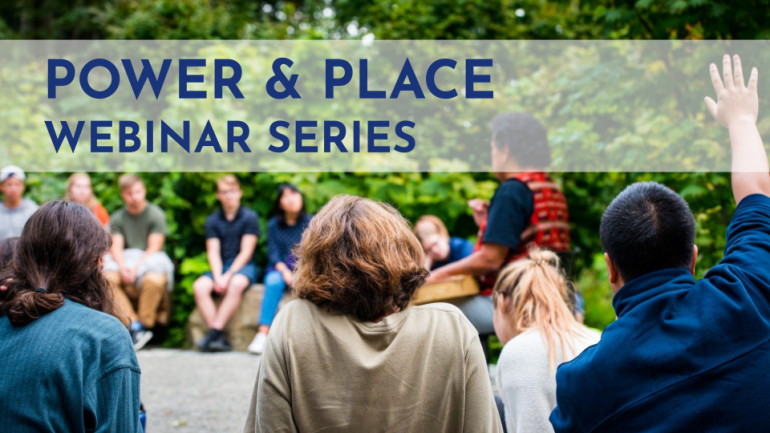| March 16, 2022 |
|
|
|
| 1-1:15 PM |
Welcome and Recognition of Place |
|
|
| 1:15-2:30 PM |
Indigenous Self-determination: Building College-Going Traditions at Haskell Indian Nations University |
Moderator: Dr. Erin Kahunawaikaʻala Wright (Kanaka ʻŌiwi Hawaiʻi), University of Hawaiʻi at Mānoa
Guest: Dr. Daniel R. Wildcat (Yuchi member of the Muscogee Nation of Oklahoma), Haskell Indian Nations University
|
In this opening session, moderator Erin Kahunawaikaʻala Wright discusses with Daniel Wildcat how Power and Place: Indian Education in America (Deloria & Wildcat, 2001) extends perspectives about first-generation college students. In addition, this session will offer experiential insights into Indigenous teaching strategies and whole-person approaches to supporting this particular student community at Haskell Indian Nations University.
This session is sponsored by NASPA’s Center for First-generation Student Success.
|
| 2:45-4 PM |
Cultivating At-a-Distance Kinship Practices: Experiential Reflections of NASNTI Leaders |
Moderator: Dr. Judith Estrada, University of California, Santa Cruz
Panelists: Gabrielle Allan (Diné/Turtle Mountain Band of Chippewa), University of Minnesota, Morris; Dr. Ashley McMillan (Lumbee), University of North Carolina at Pembroke; Byron Tsabetsaye (Diné/A:Shiwi), San Juan College
|
"Practical Indigenous professionals" (Wildcat, 2001) recognize the loss of direction that occurs when navigating two cultures, not worlds. In so doing, virtualized learning environments have engendered new ways of perceiving, cultivating, and experiencing kinship. In this second session, moderator Judith Estrada will dialogue with institutional leaders at Native American Serving Non-tribal Institutions (NASNTIs) about specific strategies, services, and approaches to sustaining relationships and connections with Native students. |
| 4:15-5:30 PM |
Centering Institutional Responsibility: Advancing Indigenous Student Success |
Moderator: Dr. Sarah Whitley, Assistant Vice President, NASPA Center for First-generation Student Success
Panelists: Sharon Singer Doctor, (Diné), Director - Student Life Experience, Office of Indigenous Student Success, Northern Arizona University; Dr. Hollie J. Mackey (Northern Cheyenne), Executive Director, Consortium for the Study of Values and Leadership and Associate Director, UCEA Graduate Student Development, North Dakota State University; Dr. Zoe Higheagle Strong (Nez Perce), Executive Director of Tribal Relations/Special Assistant to the Provost, Director, Center for Native American Research & Collaboration, and Assistant Professor, Educational Psychology, Washington State University
|
As a majority of Indigenous students also share the first-generation intersectional identity, extant literature elevates the need for asset-based approaches and a deepened understanding of identity and lived experiences to improve academic and co-curricular outcomes. This panel will discuss the power of intentionality in serving this student population, what can be learned from intersectional identities, and how asset-based approaches create important opportunities for better serving Native students. |
| March 17, 2022 |
|
|
|
| 1-1:15 PM |
Welcome and Recognition of Place |
|
|
| 1:15-2:30 PM |
A Whole Community Approach to Student Development: Perspectives of Tribal College Presidents |
Moderator: Dr. Kevin Kruger, President, NASPA
Panelists: Dr. Donna Brown (Turtle Mountain Band of Chippewa), Turtle Mountain Community College; Dr. Cynthia Lindquist (Spirit Lake Dakota), Cankdeska Cikana Community College; Dr. Leander “Russ” McDonald (Ihanktowan/Sahnish/Hidatsa/Hunkpapa), United Tribes Technical College; Dr. Laurel Vermillion (Hunkpapa-Lakota), Sitting Bull College
|
In this session, moderator Kevin Kruger engages tribal college and university (TCU) presidents on how a "whole community approach" (Williams, 2007) fosters a climate of trust and positively shapes equitable learning environments for TCU higher education communities. Participants will also gain insight into how these institutional types strengthen tribal sovereignty and self-determination and promote culturally responsive approaches to holistic student success. |
| 2:45-4:00 PM |
Stewarding Emergence: The Indigenous Peoples Knowledge Community (IPKC) in NASPA |
Moderator: Chelsea Reid (Gullah & Geechee), Boston University
Panelists: Pam Agoyo (Ohkay Owingeh, Cochiti, & Kewa Pueblos), Member at Large, NASPA Board of Directors; Dr. Karen Francis Begay (Diné), University of Arizona; Dr. Heather J. Shotton (Wichita/Kiowa/Cheyenne), University of Oklahoma
|
In this session, moderator Chelsea Reid discusses with IPKC founders the factors that led to IPKC’s emergence, including how IPKC’s origin story offers lessons about organizational ecologies, relationality, and leadership. Importantly, the practical expertise of the panelists will bring into perspective the challenges and possibilities of ushering Indigenous-centered special interest groups into existence. This session benefits participants with all levels of leadership experience. |
| 4:15-5:30 PM |
Navigating Disequilibria: A Hoghaan Dialogue Among Diné Higher Education Leaders |
Presenters: Dr. Nizhoni Chow-Garcia (Diné), California State University Monterey Bay; Dr. Charlotte E. Davidson (Diné/Mandan, Hidatsa, and Arikara Nation), Indigenous Relations Advisor, NASPA; and Kari Deswood (Diné), San Juan College |
Restoring balance is both a traditional and current-day Diné sensibility. In this closing session, Diné higher education leaders demonstrate how the Hoghaan—an east-facing, womb-based, traditional home place for Diné—serves as a type of “traditional technology” (Deloria, 2001) to introspect, negotiate, transform, and reimagine Diné engagement in organizational settings. This session benefits participants interested in utilizing Indigenous modalities to achieve harmony. |
